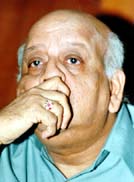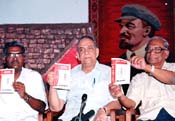Why does Seshan want to turn our many-splendoured elections
into aseptic, decorous, television-and-drawing room bores?
 Seshan's standard returns require the candidate to specify how
much he spends on his car during the campaign. Fair enough. And
easy enough for a candidate to not only add up but even produce
matching vouchers for. However, a few columns down, Seshan asks
how much the candidate spent on 'public transport' to
travel to his 'headquarters'! Panic sets in.
Seshan's standard returns require the candidate to specify how
much he spends on his car during the campaign. Fair enough. And
easy enough for a candidate to not only add up but even produce
matching vouchers for. However, a few columns down, Seshan asks
how much the candidate spent on 'public transport' to
travel to his 'headquarters'! Panic sets in.
If the candidate has a car, which he confesses to and accounts for, why
on earth should he suddenly jump on a bus or a train or a boat
to go to his 'headquarters' The candidate's own main
office in the constituency? His party district president's abode?
The party office in the state capital? Delhi? There is no time
or opportunity for clarification. Somebody rummages in his pocket
for a bus-ticket (remember bus-tickets tell no lies: they do not
bear the traveller's name!) and with relief the candidate fills
in an amount matching the rummaged bus-tickets collected: Better
to be safe than sound!
Then, there are columns and columns on what a candidate has doled
out to his agents and workers. Should this be of any concern to
the general public? Long gone are the days when pure idealism
fired the party worker and he rushed to the barricades gratis.
Your average candidate spends much more of his time persuading
his workers to get off their butts and go campaigning than he
actually spends reaching out to the people himself. And party
workers are a mercenary lot. How much is it worth my while getting
off my butt, they ask.
The bargaining goes on through the night
-- most nights. If candidates look bleary-eyed at the end of the
campaign, it has less to do with the toll taken in persuading
recalcitrant voters to vote; much more to do with waiting for
dawn to break so that the argument with party workers over money
can be brought to a close. I can understand the Election Commission
concerning itself with candidates bribing voters. Should cajoling
party workers to do their rounds at least desultorily fall in
the same category?
Then there is the environmental obsession. What launched Seshan
onto the big time was his appointment at the then bureaucratic
boondocks of the environment ministry. Then no one took the ministry
seriously -- except the prime minister. That prime minister was
so overwhelmed by Seshan's zeal that in the next four years Seshan
was catapulted from environment to internal security to defence
to Cabinet secretary. Ever grateful to the springboard which kick-jumped
him to fame (and now, with the Magsaysay Award in his pocket, to
fortune) Seshan has infused the preoccupations of the environment
ministry into the priority concerns of Nirvachan Sadan. Walls
are to be kept clean of posters; graffiti is outlawed; loudspeakers
are to be abated.
 All very well, but what has this to do with democracy? Once every
five years (actually, once every five weeks if we keep experimenting
with UF - type governments!), the world's greatest democracy goes
to the polls. The percentage of polling is higher than in any
other democracy where polling is voluntary. The remotest district
in India -- Chhimptuipui at the southern edge of Mizoram bordering
Myanmar -- recorded the highest voter turnout of the 1993 state
assembly election: over 92 per scent! It is difficult in the United
States or the United Kingdom to get much more than half the electorate
to exercise their franchise.
All very well, but what has this to do with democracy? Once every
five years (actually, once every five weeks if we keep experimenting
with UF - type governments!), the world's greatest democracy goes
to the polls. The percentage of polling is higher than in any
other democracy where polling is voluntary. The remotest district
in India -- Chhimptuipui at the southern edge of Mizoram bordering
Myanmar -- recorded the highest voter turnout of the 1993 state
assembly election: over 92 per scent! It is difficult in the United
States or the United Kingdom to get much more than half the electorate
to exercise their franchise.
Our people throw themselves with abandon into the agony and ecstasy
of elections primarily because our colourful, noisy, rumbustious
elections are the most intensive lesson in democracy anywhere
in the world. It is the Election Commission's job to encourage
the participative democrative process; it is not the Election
Commission's job to spread the environmental values of Pandara
Road.
Why does Seshan want to turn our many-splendoured elections
into the aseptic, decorous, television-and-drawing room bore that
elections in the West have become? Will his fiats increase voter-participation?
Does he really believe Election Commission hoardings urging people
to vote do more to bring the voter to the polls than the dialectical
war of party posters and wall writings, the tumult and the shouting
of the clash of candidates? In any case, is any of this part of
the Representation of People's Act?
Seshan has famously complained that his work takes him only half-an-hour
is required to prepare speeches for Rotary Clubs. Perhaps the
Election Commission would be better advised, instead, to fill
their wasted hours rationalising, updating, simplifying and making
transparent the thicket of their own babuspeak.
|





 Seshan's standard returns require the candidate to specify how
much he spends on his car during the campaign. Fair enough. And
easy enough for a candidate to not only add up but even produce
matching vouchers for. However, a few columns down, Seshan asks
how much the candidate spent on 'public transport' to
travel to his 'headquarters'! Panic sets in.
Seshan's standard returns require the candidate to specify how
much he spends on his car during the campaign. Fair enough. And
easy enough for a candidate to not only add up but even produce
matching vouchers for. However, a few columns down, Seshan asks
how much the candidate spent on 'public transport' to
travel to his 'headquarters'! Panic sets in.
 All very well, but what has this to do with democracy? Once every
five years (actually, once every five weeks if we keep experimenting
with UF - type governments!), the world's greatest democracy goes
to the polls. The percentage of polling is higher than in any
other democracy where polling is voluntary. The remotest district
in India -- Chhimptuipui at the southern edge of Mizoram bordering
Myanmar -- recorded the highest voter turnout of the 1993 state
assembly election: over 92 per scent! It is difficult in the United
States or the United Kingdom to get much more than half the electorate
to exercise their franchise.
All very well, but what has this to do with democracy? Once every
five years (actually, once every five weeks if we keep experimenting
with UF - type governments!), the world's greatest democracy goes
to the polls. The percentage of polling is higher than in any
other democracy where polling is voluntary. The remotest district
in India -- Chhimptuipui at the southern edge of Mizoram bordering
Myanmar -- recorded the highest voter turnout of the 1993 state
assembly election: over 92 per scent! It is difficult in the United
States or the United Kingdom to get much more than half the electorate
to exercise their franchise.